Greek house price growth accelerating!
After nine years of falling house prices, the Greek housing market is now growing strongly again amidst improving economic conditions and market expansionary measures.
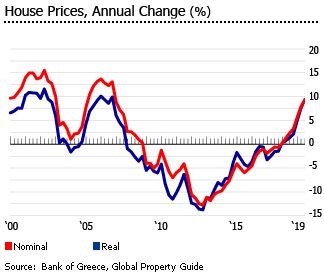
In Greece’s urban areas, house prices rose by 9.32% during the year to Q3 2019, far higher than the previous year’s 2.35% growth and the highest annual increase in house prices since Q4 2006, according to the Bank of Greece. When adjusted for inflation, house prices increased by 9.39%. Quarter-on-quarter, house prices in urban areas were up 2.23% in Q3 2019 (3.46% in real terms).
This sharp improvement was also seen in the major cities:
- Athens led with an annual house price increase of 11.91% in Q3 2019 (11.99% in real terms), the capital’s best performance since Q2 2006. During the latest quarter, house prices rose by 2.21% (3.43% in real terms).
- In Thessaloniki, the country’s second largest city, house prices rose by 8.52% (8.59% in real terms) y-o-y in Q3 2019, a sharp improvement from last year’s 1.32% annual rise - the highest growth since Q2 2007. Quarter-on-quarter, prices increased by 0.7% (1.9% in real terms) in Q3 2019.
- In other cities (excluding Athens and Thessaloniki), house prices rose 6.87% (6.94% in real terms) during the year to Q3 2019, an improvement from y-o-y rise of 0.8% a year earlier. During the latest quarter, prices increased 2.5% (3.7% in real terms) in Q3 2019.
Greek residential property prices fell 40.8% (-45.1% in real terms) from 2008 to 2018.
Demand is now surging, with residential property transfers in Athens rising by double-digit figures in the past four years. Construction permits soared 24.5% to 11,744 units during the first nine months of 2019, following annual rises of 10.1% in 2018 and 9% in 2017, according to the Hellenic Statistical Authority, though the total remains far below the 70,000 to 80,000 permits issued annually from 2004 to 2007.
To revive the housing market, the Greek government has offered residence to non-EU investors purchasing or renting property worth over €250,000, similar to Hungary, Spain and Portugal. The plan is valid for five years and is open to renewal.
Other measures introduced by newly elected Prime Minister Kyriakos Mitsotakis of the centre-right New Democracy party:
- Suspension of VAT payments on new building permits: PM Mitsotakis announced in October 2019 a three-year suspension of VAT payments on any new building permits and unsold properties built after January 1, 2006.
- Reduction of the single property tax (ENFIA): The ENFIA for individuals was reduced last year: 30% reduction for properties valued up to €60,000; 27% for those valued up to €70,000; 25% for those valued up to €80,000; 20% for those valued up to €1 million; and 10% for properties valued more than €1 million. A further 10% reduction, on average, will apply on all property owners from the year 2020.
High property taxes had discouraged many potential buyers, because property taxes had increased seven times since the global financial crisis. In 2018, ENFIA tax revenues amounted to €3.15 billion, up from €500 million in 2009.
Reducing taxes has been one of the priorities of the Mitsotakis government.
The Greek economy grew by around 2% in 2019, according to the International Monetary Fund (IMF) – slightly up from last year’s 1.9% expansion and the highest growth since 2007.
After a short-lived recovery in 2014, Greece’s economy returned to recession in 2015, with GDP contracting by 0.4% and by another 0.2% in 2016. The country’s real GDP had contracted by 3.2% in 2013, 7.3% in 2012, 9.1% in 2011, 5.5% in 2010, 4.3% in 2009 and 0.3% in 2008.
The IMF expects Greek GDP to grow by.2% this year but the European Commission is slightly more optimistic, projecting 2.3% growth.
Moderate rental yields; stable rents
In the centre of Athens gross rental yields on apartments are moderate, at around 4.2% for apartments of 120 square metres (sq. m), but proportionately more for smaller apartments, according to Global Property Guide research.
The gross rental yield for apartments located in suburbs of Athens is slightly higher, at about 4.5%.
Houses in the suburbs have very low yields, ranging from 2.6% to 3.2%.
In Crete, gross rental yields of apartments are around 3%. As in Athens, smaller apartments tend to earn higher yields.
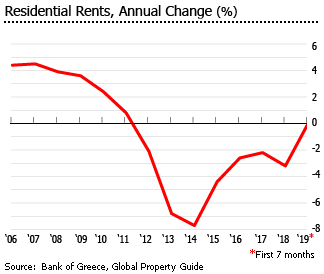
During the first seven months of 2019, the central bank’s rent index for dwellings was unchanged from a year earlier, after annual declines of 3.2% in 2018, 2.2% in 2017, 2.6% in 2016, 4.4% in 2015, 7.7% in 2014, 6.8% in 2013, and 2.1% in 2012, according to the Bank of Greece.
In Athens, monthly rents per sq. m. range from around €9 to €16 per sq. m., according to Global Property Guide. In Crete, monthly rents per sq. m. of apartments range from around €4 to €7 per sq. m.
Around three fourths of the Greeks are homeowners, with a homeownership rate of 73.5% in early-2019, according to the Eurostat. The rental market comprises about 20% of the dwelling stock.
Rapid urbanization has led to a sharp dichotomy between urban and rural areas. Based on the 2011 census, more than 35% of the housing stock is vacant, mostly in rural areas. These units are typically dilapidated, or in need of total rehabilitation.
On the other hand, dwelling units in urban areas are amongst the most crowded in Europe. Most children continue to live with their parents after they enter adulthood. The reduction of notary fees from 1.2% to 1% of the real estate’s value was clearly insufficient in reducing the high transaction cost, which adds to the burdens of first-time homebuyers.
Housing boom and bust
Once upon a time Greece was a happy country, and property owners were specially happy! Real estate agents reported 30% to 40% annual price rises for properties near the sea in 2004. In Athens, house prices rose 11.2% in 2006, before slowing to 6.2% in 2007.
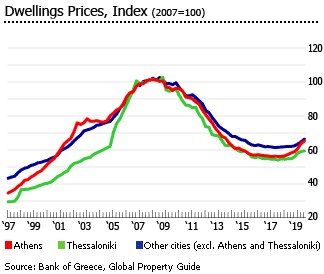
When the crisis hit residential property prices began falling dramatically. Here are house price for in Athens:
HOUSE PRICE INDEX, ANNUAL CHANGE (%) |
||
| Year | Nominal | Inflation-adjusted |
| 2008 | -0.77 | -3.57 |
| 2009 | -4.21 | -6.04 |
| 2010 | -5.83 | -10.40 |
| 2011 | -8.00 | -10.49 |
| 2012 | -12.91 | -13.88 |
| 2013 | -11.45 | -9.47 |
| 2014 | -6.80 | -5.04 |
| 2015 | -4.99 | -4.41 |
| 2016 | -0.91 | -0.47 |
| 2017 | -0.45 | -1.27 |
| 2018 | 4.85 | 3.71 |
| Sources: Bank of Greece, Global Property Guide | ||
Between 2008 and 2018, house prices in Athens fell by 41.4% (-45.7% in real terms).
Why Greece had eight years of crisis
When the euro was first introduced in 1999, Greece was left out because of its high budget deficit and inflation. Embarrassed by the isolation, Greece appeared to clean up its act and fix its finances and macroeconomic fundamentals. By January 2001, it was able to adopt the euro as official currency.
In November 2004, however, Greece admitted that it had fudged its figures to gain entry into the Eurozone. Since 1999 its budget deficit had never been within the EU limit of 3% of GDP. It was also revealed in early 2010 that Greece had paid Goldman Sachs and other banks to hide the true amount of its debt and borrowing.
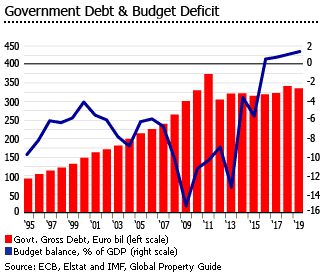
Euro adoption brought access to cheap funds allowing the Greek government to pump-prime the economy, pushing the national debt from €224.2 billion in 2006 to €341.4 billion in 2018 (from 103.6% to 181.2% of GDP).
The debt is now falling - down to €335.6 billion (or 175.2% of GDP) in 2019 and estimated to fall to 169.3% of GDP this year, according to the European Commission.
When it became clear that the spending spree was unsustainable, creditors and the EU together with other international institutions such as the IMF demanded that Greece cut its spending, including wages and pensions.
This was met with severe resistance, manifested in public protests and rioting.
Seeking a fresh mandate, the New Democracy Party called for a snap election two years earlier than required, and was soundly defeated by the Pan-Hellenic Socialist Movement (PASOK) headed by George Papandreou, who then became prime minister. But after assuming office in October 2009, Papandreou revealed that the deficit was much higher than the previous government had claimed. He vowed to downsize the public sector and fight rampant tax evasion.
In May 2010, European leaders and the International Monetary Fund (IMF) agreed to a three-year, €110 billion bailout for Greece which was tied to additional austerity measures. These moves lead to a 4% economic contraction in 2010.
Violent protests, rallies, and strikes followed.
The continued demand for cuts and more cuts in the face of already-high levels of public misery led to the rise of the radical leftist party Syriza, a coalition of diverse elements. Its leader, Alexis Tsipras, led Syriza to victory when the government’s majority collapsed. Syriza assumed office on January 26, 2015.
Despite Tsipras having earlier pledged "No more bailouts, no more submission, no more blackmailing," Greece and its creditors agreed a third bailout worth €86 billion in August 2015, imposing further spending cuts. As part of the deal, the government passed a pension and tax reform bill in May 2016, which aimed to raise taxes and increase social security and pension contributions for most Greeks to bring about €5.4 billion in budget savings.
Growth has returned
In August 2018, Greece finally exited its eight-year bailout program. But it remains subject to scrutiny from its European creditors.
“We have had eight very difficult years, often very painful years, where we have had three successive programmes. But now Greece can finally turn the page in a crisis that has lasted too long,” said Pierre Moscovici, the European commissioner for economic and financial affairs. “The worst is over.”
“Greece’s economy is growing again, there is a budget and trade surplus, and unemployment is falling steadily,” said Mário Centeno, the chair of the European Stability Mechanism.
In the July 2019 elections, centre-right New Democracy party won landslide victory receiving 39.7 of all votes, defeating Tsipras’ incumbent leftwing Syriza party. Its leader, Kyriakos Mitsotakis became the new prime minister. The New Democracy’s victory was mainly attributed to Mitsotakis’ efforts to persuade centrists and to the conservatives’ ability to obtain votes from Golden Dawn by taking a tough stance on immigration and on an accord struck by Tsipras resolving a long-running name row over Macedonia, Greece’s neighbor to the north.
Construction activity rising strongly
Residential construction in Greece is rising again, after almost a decade of declining activity. In 2018, building permits rose by 10.1% y-o-y to 15,180 units, following 9% annual growth in 2017 and y-o-y declines of 5.3% in 2016, 0.6% in 2015, 18.2% in 2014, and 28.1% in 2013. Despite this, it remains far lower than the 70,000 to 80,000 permits issued annually from in 2004 to 2007.
The recovery extended last year. During the first nine months of 2019 (based on figures from Hellenic Statistical Authority):
- Number of permits: 11,744 units, up 24.5% from a year earlier
- Floor space: 2.5 million sq. m., up 6.6% from a year earlier
- Volume: 11.15 million cu. m., up 9.7% from a year ago
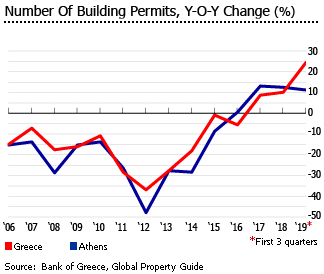
Construction activity is expected to be boosted by PM Mitsotakis’ announcement of the suspension of VAT on new properties and on unsold properties built after January 1, 2006.
The VAT exemption is also applicable to situations known as “antiparochi”, where owners provide land to builders in exchange for a number of future apartments.
Mortgage interest rates remain low
The new loans market has virtually collapsed. New housing loans fell slightly by 0.7% y-o-y during the first eleven months of 2019, to €472.4 million. Contrast this tiny figure with €6.6 billion loans in 2010 and €15.4 billion loans in 2006. Outstanding housing loans were down by almost 34% in 2019 from the peak in 2010.
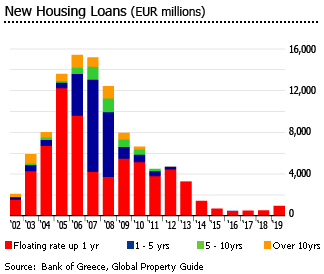
The average interest rate for new housing loans with initial rate fixation (IRF) of up to one year stood at 2.84% in November 2019, far lower than the interest rate of 5.35% in November 2008. No data exists on lending for longer IRFs.
For outstanding housing loans:
- Average mortgage rates for loans with IRF of between 1 and 5 years stood at 4.38% in November 2019, down from 4.58% in November 2018 and still lower than the interest rate of 5.36% in November 2008.
- Average mortgage rates for loans with IRF of over 5 years declined to 2.06% in November 2019, slightly down from 2.13% in November 2018 and 5.08% in November 2008.
The Greek housing market is vulnerable to interest rate movements as the majority of housing loans have an IRF of up to one year only. Since the second half of 2009, 70% or more of new housing loans have had interest rates adjustable at least annually.
By maturity (euro-denominated housing loans from domestic credit institutions) the present situation is:
- Up to 1 year: €684 million in November 2019, according to Bank of Greece
- 1-5 years: €618 million, down 9.1% from a year earlier
- Over 5 years: €46.1 billion, down 7.4% from a year ago
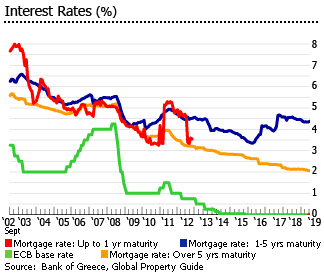
Since the global financial crisis, cash-basis property transactions have accounted for about 80% of all transactions with only 20% relying on bank loans, according to the Bank of Greece.
The banking system is still in a mess
Despite renewed economic growth, unemployment remains high and many house-owners cannot repay their mortgage debt. Greek banks hold about €88.6 billion in bad loans – almost half of total loans and equivalent to about half of the country’s annual economic output. More specifically, a recent report released by the European Parliament showed that Greek banks have the highest non-performing loans (NPL) ratio across the eurozone, at 44.8%, followed by Cyprus (34.1%) and Portugal (12.4%). Of these, around 41% are delinquent mortgages.
The percentage of non-performing housing loans increased to 33.7% by early-2019, up from 10% in 2010, according to the Bank of Greece.
The “Katselis Law” or Household Insolvency Law, enacted in 2010, provides protection for primary residences, especially to families with incomes below the poverty line. The law freezes foreclosures on houses with outstanding mortgage debt worth up to €200,000, where a family’s annual income is lower than €35,000. However these homeowners must pay at least 10% of their net monthly income towards their mortgage. The law expired at the end of February 2019.
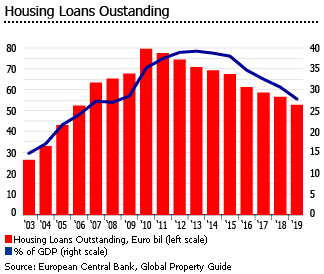
Banks have started to help solve the problem and sold €12.5 billion of NPLs to investors in 2018, according to Evercore. But this is not enough to bring the amount of bad loans at sustainable levels.
“The four systemic banks have agreed among themselves to reduce the non-performing loans between now and 2021 by €50 billion,” said the CEO of Piraeus Bank.
“€50 billion is almost 28% of the GDP of this country. It is a significant percentage vis-à-vis the actual percentage being produced by this country,” the Piraeus Bank CEO added. The four banks include the National Bank of Greece, Piraeus Bank, Eurobank, and Alpha Bank.
To provide further relief, the EU has approved in October 2019 a scheme designed to help Greek banks rid themselves of toxic debts. The measure, named Hercules Asset Protection Scheme, will allow the Greek government to guarantee a portion of bad loans that banks sell on to investors. It would enable Greek banks to reduce bad loans by up to €30 billion.
Greek economy continues to recover
The Greek economy grew by around 2% in 2019, according to the International Monetary Fund (IMF) – slightly up from last year’s 1.9% expansion and the highest growth since 2007. The IMF expects the Greek economy to grow further by another 2.2% this year but the European Commission is slightly more optimistic, projecting a 2.3% growth.
After a short-lived recovery in 2014, Greece’s economy returned to recession in 2015, with GDP contracting by 0.4% and by another 0.2% in 2016, amidst the imposition of capital controls and the shutting down of most of its banks. Before this, the country’s real GDP had contracted by 3.2% in 2013, 7.3% in 2012, 9.1% in 2011, 5.5% in 2010, 4.3% in 2009 and 0.3% in 2008, according to the IMF.
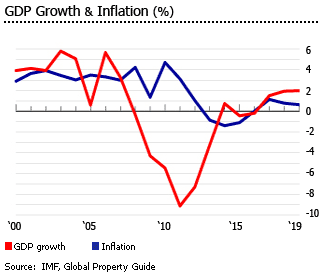
Greece saw a budget surplus of 1.3% of GDP in 2019, after surpluses of 1% in 2018, 0.7% in 2017 and 0.5% in 2016, according to the European Commission. Greece registered an average budget deficit of 9.7% annually from 2009 to 2015. The county is expected to remain in surplus in the next two years.
The country’s debt is expected to fall to 169.3% of GDP this year and to 163.1% of GDP in 2021, according to the European Commission, down from 175.2% in 2019 and 181.2% in 2018.
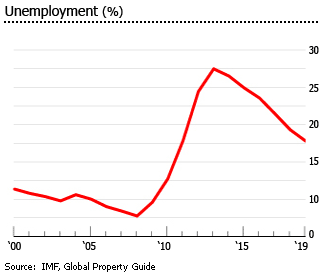
Unemployment was 16.8% in September 2019, down from 18.6% in September 2018, and 20.8% two years ago, according to the Eurostat. Despite this, Greece’s jobless rate remains the highest in the EU.
Consumer prices rose slightly by 0.2% in November 2019 from a year earlier, according to the Hellenic Statistical Authority. Inflation is projected to accelerate to remain low at 0.6% this year and 0.9% in 2021, according to the European Commission.
Sources:
- Real estate market (Bank of Greece): https://www.bankofgreece.gr/en/statistics/real-estate-market
- Summary table of key short-term indicators for the real estate market (Bank of Greece): https://www.bankofgreece.gr/RelatedDocuments/TE_SHORT-TERM_INDICES.pdf
- World Economic Outlook Database, October 2019 (International Monetary Fund): https://www.imf.org/external/pubs/ft/weo/2019/02/weodata/weorept.aspx?
- Economic forecast for Greece (European Commission): https://ec.europa.eu/info/business-economy-euro/economic-performance-and-forecasts/economic-performance-country/greece/economic-forecast-greece_en
- Greece Government Budget (Trading Economics): https://tradingeconomics.com/greece/government-budget
- Bank deposit and loan interest rates (Bank of Greece): https://www.bankofgreece.gr/en/statistics/financial-markets-and-interest-rates/bank-deposit-and-loan-interest-rates
- Unemployment in Bulgaria in November 2019 was 3.7% – Eurostat (The Sofia Globe): https://sofiaglobe.com/2020/01/09/unemployment-in-bulgaria-in-november-2019-was-3-7-eurostat/
- Rental returns are moderate to good in Greece (Global Property Guide): https://www.globalpropertyguide.com/Europe/Greece/Rental-Yields
- Greece Inflation Rate (Trading Economics): https://tradingeconomics.com/greece/inflation-cpi
- Greece Home Ownership Rate (Trading Economics): https://tradingeconomics.com/greece/home-ownership-rate
- Characteristics of dwellings-households/2011 (Hellenic Statistical Authority): https://www.statistics.gr/en/statistics/-/publication/SAM05/-
- Top Greek bank CEO calls on lenders to do more in reducing the country’s bad debts (CNBC): https://www.cnbc.com/2019/02/19/piraeus-bank-greece-to-reduce-50-billion-euros-of-bad-loans-by-2021.html
- Mountain of Crisis-Era Bad Debt Puts Brakes on Greece’s Rebound (Bloomberg): https://www.bloomberg.com/news/articles/2019-02-08/mountain-of-crisis-era-bad-debt-puts-brakes-on-greece-s-rebound
- EU signs off on Greek scheme to clean up banks’ bad debts (Financial Times): https://www.ft.com/content/22683f5a-eb41-11e9-85f4-d00e5018f061
- Greece profile – Timeline (BBC News): https://www.bbc.com/news/world-europe-17373216
- Greek elections: landslide victory for centre-right New Democracy party (The Guardian): https://www.theguardian.com/world/2019/jul/07/greeks-choose-between-beach-and-ballot-in-first-post-debt-bailout-poll
- Greece Freezes VAT on New Building Permits to Boost Housing Market (Greek Reporter): https://greece.greekreporter.com/2019/10/24/greece-freezes-vat-on-building-permits-to-boost-housing-market/
- Building activity / September 2019 (Hellenic Statistical Authority): https://www.statistics.gr/en/statistics/-/publication/SOP03/-
- INSIGHT: Greece—On the Road to Recovery? (Bloomberg Tax): https://news.bloombergtax.com/daily-tax-report-international/insight-greece-on-the-road-to-recovery
- ENFIA cut to benefit everyone (ekathimerini.com): http://www.ekathimerini.com/242869/article/ekathimerini/business/enfia-cut-to-benefit-everyone